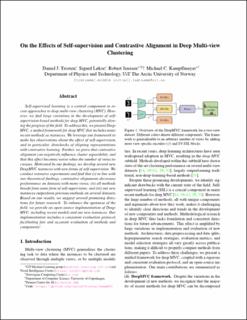On the Effects of Self-supervision and Contrastive Alignment in Deep Multi-view Clustering
Journal article, Peer reviewed
Accepted version
Permanent lenke
https://hdl.handle.net/11250/3119441Utgivelsesdato
2023Metadata
Vis full innførselOriginalversjon
Computer Vision and Pattern Recognition. 2023, 23976-23985. 10.1109/CVPR52729.2023.02296Sammendrag
Self-supervised learning is a central component in recent approaches to deep multi-view clustering (MVC). However, we find large variations in the development of self-supervision-based methods for deep MVC, potentially slowing the progress of the field. To address this, we present Deep-MVC, a unified framework for deep MVC that includes many recent methods as instances. We leverage our framework to make key observations about the effect of self-supervision, and in particular, drawbacks of aligning representations with contrastive learning. Further, we prove that contrastive alignment can negatively influence cluster separability, and that this effect becomes worse when the number of views increases. Motivated by our findings, we develop several new DeepMVC instances with new forms of self-supervision. We conduct extensive experiments and find that (i) in line with our theoretical findings, contrastive alignments decreases performance on datasets with many views; (ii) all methods benefit from some form of self-supervision; and (iii) our new instances outperform previous methods on several datasets. Based on our results, we suggest several promising directions for future research. To enhance the openness of the field, we provide an open-source implementation of DeepMVC, including recent models and our new instances. Our implementation includes a consistent evaluation protocol, facilitating fair and accurate evaluation of methods and components11Code: https://github.com/DanielTrosten/DeepMVC. On the Effects of Self-supervision and Contrastive Alignment in Deep Multi-view Clustering
